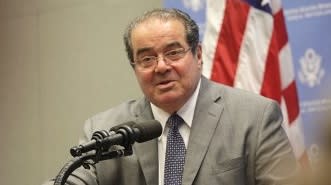Scalia’s religion remarks and the First Amendment
In this commentary, Keith Werhan from Tulane Law School says Justice Antonin Scalia’s recent remarks about the First Amendment favoring religion are a strained reading of the Constitution.
The Supreme Court’s denial of certiorari on Monday in Elmbrook School District v. Doe is most noteworthy for Justice Antonin Scalia’s “the First Amendment explicitly favors religion” shot-across-the-bow in his dissenting opinion.
It’s a claim that’s more quotable than accurate.
The Court’s denial let stand an en banc decision by the Seventh Circuit holding that Elmbrook’s practice of conducting high school graduation and related ceremonies at a non-denominational, evangelical Christian church violated the establishment clause of the First Amendment. (Doe v. Elmbrook School District, 687 F.3d 840 (7th Cir. 2012.) According to the Seventh Circuit, the “constitutional flaw” of “bring[ing] seminal schoolhouse events to a church” is that “it necessarily conveys a message of endorsement [of religion].” The court primarily relied on an unbroken line of Supreme Court decisions disallowing governmental efforts to introduce religious practices or instruction into public schools. As the court put it, Elmbrook’s practice of conducting graduation ceremonies in a church “put a spiritual capstone on an otherwise-secular education.”
In his dissenting opinion, Justice Scalia, joined only by Justice Clarence Thomas, argued that the Seventh Circuit’s decision was “fundamentally inconsistent” with the Court’s decision earlier this year in Town of Greece v. Galloway, 134 S.Ct 1811 (2014). In Town of Greece, The Court upheld Greece’s practice of opening its monthly board meetings with a prayer offered by a series of volunteer chaplains, virtually all of whom were Christian. The Court essentially found that an earlier decision allowing a practice of opening legislative sessions with a prayer controlled. (Marsh v. Chambers, 463 U.S. 783 (1983). In Marsh, the Court had relied almost exclusively on a history of legislative prayer dating back to the nation’s finding. According to the Court in Greece, “Marsh stands for the proposition that it is not necessary to define the precise boundary of the Establishment Clause where history shows that the specific practice is permitted.” The Court in Greece found that opening sessions of local governmental bodies with a prayer was permissible under the Marsh principle.
Marsh has typically been understood as an outlier in establishment clause jurisprudence, and the major question after Town of Greece is whether the Roberts Court’s rehabilitation of Marsh not only reaffirmed the constitutional legitimacy of legislative prayer, but also undermined establishment clause precedent that has found government support of religious practices in other contexts to be unconstitutional.
In Tuesday’s New York Times, David Leonhardt, giving due credit to his colleague Adam Liptak, wrote, “On divisive social issues, the Roberts court first tends to issue narrow rulings, with the backing of both conservative and liberal justices.”
“In later terms,” Leonhardt continued, “the five conservative justices deliver a more sweeping decision, citing the earlier case as precedent.”
Justice Scalia’s dissenting opinion applying Town of Greece’s constitutional approval of legislative prayer to the very different context of religious endorsements in public schools setting evokes the strategic long game Liptak and Leonhardt have described. Justice Scalia suggests that the Court’s lack of concern with government endorsement of religion and individual coercion in the legislative prayer context rules out those concerns in the public school context, where, as the Seventh Circuit notes, they have been of the utmost concern in past Supreme Court decisions.
Most pointedly, Justice Scalia argues that the Seventh Circuit decision is inconsistent with a First Amendment that “explicitly favors religion.” And indeed, the Seventh Circuit opened its analysis with the observation, “[T]he touchstone for Establishment Clause challenges remains ‘the principle that the First Amendment mandates government neutrality between religion and religion, and between religion and nonreligion’ ” (quoting from a recent Supreme Court opinion).
It is at best a half-truth to say that the First Amendment favors religion. It is correct, of course, that the religion clauses demarcate religion, and freedom of conscience regarding religion, as an issue of special constitutional concern. But the insinuation of Justice Scalia’s pithy sound bite is that the best reading of the religion clauses provides constitutional backing for government endorsements of religion rather than for government neutrality toward religion. That’s a strained reading of a First Amendment that prohibits laws respecting government establishments of religion and of a Constitution that makes no mention of the Divine and that forbids religious tests for holding public office.
Whether Town of Greece is the first harbinger of the kind of reversal of First Amendment jurisprudence that Justice Scalia has in his sights is highly questionable. First, the conservative justices were unable to entice any of their liberal colleagues to join them in their wholesale endorsement of legislative prayer. Second, three of the five conservatives (Chief Justice John Roberts and Justices Samuel Alito and Anthony Kennedy) joined an opinion that focused narrowly on the legislative prayer context. And third, none of those three justices joined Justice Scalia’s dissent in Elmbrook School District. A Court that split five-four in Town of Greece largely agreed not to explore the implications of that decision in the public school context, at least for now.
Keith Werhan is the Ashton Phelps Chair in Constitutional Law at Tulane Law School.
Recent Stories On Constitution Daily
Constitution Check: Does being a child still make a constitutional difference?


